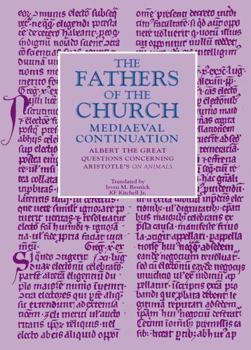Questions Concerning Aristotle's on Animals
After the Latin translation of Aristotelian works outside the logica vetus began in earnest in twelfth-century Spain, it remained to Scholastic philosophers to assimilate the new materials. Although many individuals commented on the logica nova and on some of Aristotle's books on natural philosophy, Albert the Great is one of only a very few Scholastics to comment on the entire collection of Aristotle's biological works. This text, the Questions concerning Aristotle's On Animals [Quaestiones super de animalibus] , recovered only at the beginning of the twentieth century and never before translated in its entirety, represents Conrad of Austria's report on a series of disputed questions that Albert the Great addressed in Cologne ca. 1258. The Questions, in nineteen books, mixes two distinct genres: the scholastic quaestio, with arguments pro et contra, a determination, and answers to the objections; and the straightforward question-and-response found, for example, in The Prose Salernitan Questions. Here, even more clearly perhaps than in his slightly later and much larger paraphrastic commentary On Animals [De animalibus], Albert adduces his own views?often criticizing other medieval physicians and natural philosophers?on comparative anatomy, human physiology, sexuality, procreation, and embryology. This translation, based on the critical edition that appeared in the Cologne edition of Albert's work, helps to explain the title "patron saint of scientists" bestowed upon Albert by Pope Pius XII. This work should find its audience among medievalists and historians of science and culture. More so than the massive On Animals, it should prove useful in the classroom as an encyclopedia or handbook of medieval life.
Format:Hardcover
Language:English
ISBN:0813215196
ISBN13:9780813215198
Release Date:September 2008
Publisher:Catholic University of America Press
Length:574 Pages
Weight:1.64 lbs.
Dimensions:1.4" x 5.7" x 8.5"
Customer Reviews
0 rating





